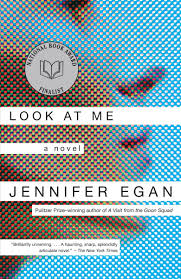An Unblinking, Forward Looking Eye
There’s a hard and provocative edge to Jennifer Egan’s award-winning novel, Look at Me. Not quite clinical, the book nevertheless possesses a clarity of focus that makes one think. The book came out in 2001 and it has an eerie ability to zero in on trends and directions. Egan forecast many important features of our twenty-first century lives, from undercover terrorists to reality television to the web’s troubled relationship with authenticity. It is not a book about the future, but this many years on, it is difficult not to be aware of its prescience.

Look at Me is a novel of several moving pieces. At its center is Charlotte, a thirty-something model from Rockford, Illinois, whose face was destroyed in an automobile crash. Surgery gives her a new appearance and raises many questions. Charlotte had long been somewhat disassociative and her choices often complicated, if not downright self-destructive. She fled her childhood home and her life as a model had been all about, unsurprisingly, appearance. Charlotte’s new face calls her identity into question, as does an extended recuperative stay in Illinois.
This theme – identity and its power to define and confuse – are traced through several other characters: childhood friends of Charlotte’s, children and relatives, an alcoholic detective, and a fugitive who adopts a new persona. The characters interact in a complicated dance that at times feels just a tiny bit too pat, but nonetheless is satisfying.
Egan casts a wide net of social commentary throughout. There are some mild moves into farce or satire, but it is not the focus. Egan’s deeper instincts are more philosophical. She is, at heart, a novelist keen on telling a story and explaining something important about modern life, alienation and identity. Even as she cares about her characters, Egan maintains a discipline throughout.
Egan is a very smart writer. This novel is engaging, but engaging from a distance. Reading it felt a bit like pulling things up through binoculars. Everything is a little sharper, a little more clear – and without a strong sense of knowing exactly where we are. We cannot really trust what is just outside the frame. I enjoyed Look At Me even as I found it disconcerting. It is a good novel.
David Potash